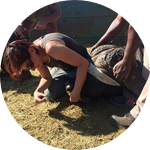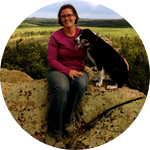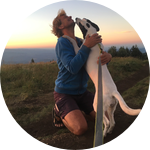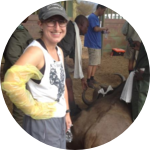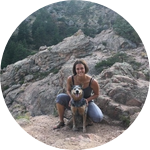About This Project
Wild and domestic animal populations often border each other around national parks (i.e. Yellowstone, Kruger National Park, etc) and are able to transmit diseases back and forth - like brucellosis. Mosquitoes are able to bridge fences so they can spread mosquito-borne diseases (Rift Valley Fever) across them. This presents a serious conservation risk. We propose to study mosquito borne diseases on the cattle-buffalo interface in Kruger National Park, South Africa.
Ask the Scientists
Join The DiscussionWhat is the context of this research?
Conflicts between conservation areas and surrounding communities are varied, but often the risk of disease transmission is discussed (i.e. brucellosis in yellowstone). However very little is often known about the real risk for diseases to transmit between wildlife and livestock. Especially little is known for mosquito-borne viral diseases that are globally on the rise (link) which often have both wildlife and domestic animal hosts (link). Hence, research is needed to evaluate whether conservation areas decrease or increase disease risk - i.e. is there more disease in wildlife or livestock and which way do diseases spill? We are seeking to fill that gap using a study of buffalo and cattle diseases using a park/farm interface.
What is the significance of this project?
We have previously shown that in our study system, mosquito communities are very different between inside the park and outside the park, with disease carrying mosquitoes more common outside the park (video). Whether this translates to more disease in livestock outside the park is unknown. We will use this study to determine if the occurrence of disease is indeed higher outside the park, where the disease causing vectors are more common. If this is the case then the conservation area may be acting as a buffer, reducing disease spread. We may then be able to design efforts to reduce the proportion of disease carrying mosquito species that mimic the conservation areas natural actions.
What are the goals of the project?
We will assess whether the risk of mosquito-borne disease developing in domestic bovids outside the park is indeed higher than the risk to wild bovids inside the park, as suggested by our mosquito species data. To do this we will use samples collected from cattle (400 samples) and buffalo (400 samples) during the same time period (1.5 years) at neighboring sites inside and outside the park. We will then use serological disease diagnostics to test the blood for exposure to the relevant diseases (West Nile, Rift Valley Fever, Wesselsbron) over a 2 year time period during which outbreaks are known to have occurred. We will communicate our results directly directly to park managers to aid in conservation efforts, in addition to publishing in scientific journals.
Budget
During 2015-17 samples were collected from African Buffalo in Kruger National Parkand cattle in the Mnisi area (a One Health study location). This 2015-2017 period is particularly interesting because we had an outbreak of buffalo abortions during the time - which coincided with increase in mosquitoes, suggesting that Rift Valley Fever or another mosquito borne disease may be responsible for this. The budget proposed here will be used to test samples for antibodies to mosquito borne diseases (Rift Valley Fever, Wesselbron Disease, West Nile Virus), that may spread between wildlife and livestock, and are also known to cause abortions in buffalo/cattle (citation).
Endorsed by
 Project Timeline
Project Timeline
Samples have been collected and currently stored in the freezer. We will test them for diseases between November and December 2018. We will then process and analyze the data by March 2019, with publication and dissemination of the results by July 2019.
Aug 21, 2018
Project Launched
Dec 21, 2018
Sample analysis completed
Mar 29, 2019
Data analyzed
Jul 26, 2019
Results disseminated for publication and to park managers
Meet the Team
Affiliates
Affiliates
Team Bio
Our team represents vector ecologists (Maarten Schrama), veterinarians (Brianna Beechler) and disease ecologists (Courtney Coon, Erin Gorsich) giving us the unique background to successfully address these questions. We have all worked and lived around Kruger National Park for several years and have direct connections to the land and managers.
Brianna Beechler, DVM, Ph.D.
I grew up in Central Oregon enjoying the freedom and space provided to me while living in the Mt. Hood National Forest. This unique childhood, coupled with my interest in nature, led me to a career as a wildlife veterinarian. I have spent time researching a diversity of wildlife species such as bighorn sheep and African buffalo, while living and working in unique places across the globe. My research seeks to understand ways in which having preserved wild areas benefits humans and the earth and how conservation strategies can be used to limit disease transmission.
Maarten Schrama
I am an ecologist and am interested in conservation and mosquitoes and mosquito borne diseases. Currently, my research mostly revolves around mosquitoes and mosquito-borne diseases and how human land use changes affect these.
Courtney Coon
Courtney is a central California native with a bachelors in animal biology from UC Davis and a PhD from the University of South Florida. She is interested in examining the role of host and environmental variation in animal health. For her graduate degree, she primarily investigated the ecological interactions between a recently invaded songbird, its native competitors, and their shared parasites in Kenya. She then worked for two years as a post-doctoral fellow at the University of Pretoria in South Africa where she studied infection incidence and immunity in wild African buffalo inside a wildlife preserve and domestic cattle that live near the preserve boundaries. She's been working at Felidae Conservation Fund for the Bay Area Puma Project since June 2016.
Erin E. Gorsich
I am a quantitative disease ecologist with broad interests in disease dynamics, wildlife health, and conservation. My work combines host ecology or community ecology to understand infection dynamics.
Lab Notes
Nothing posted yet.
Project Backers
- 14Backers
- 10%Funded
- $382Total Donations
- $27.29Average Donation

